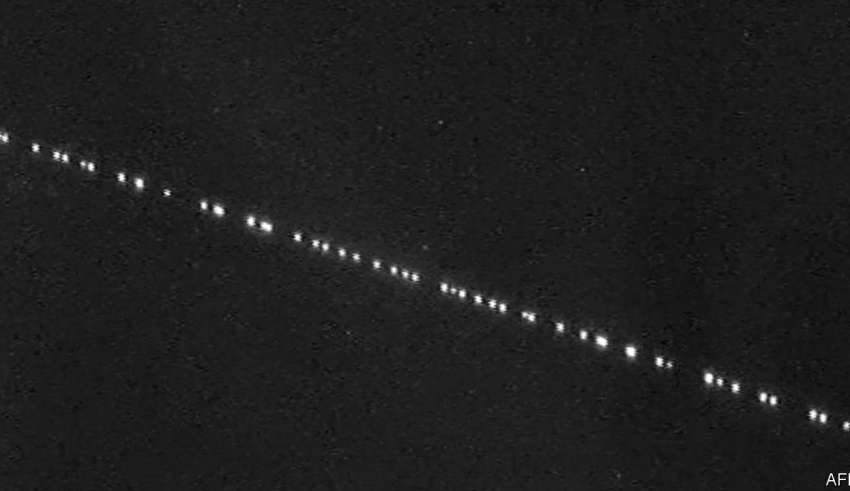It was quite a show: a train of illuminated dots moving across the sky, many of them as bright as Polaris, the north star.
這是一場相當(dāng)精彩的表演:一列發(fā)光的小點(diǎn)在天空中移動,其中許多亮得像北極星一樣。
These were not new astronomical objects, however.
但這些并不是新的天文體。
Rather, they were the first tranche of satellites for Starlink, a project intended to provide internet access across the globe.
相反,它們是星鏈項(xiàng)目的第一批衛(wèi)星,該項(xiàng)目旨在為全球提供互聯(lián)網(wǎng)接入。
These were launched into orbit on May 24th by SpaceX, an American rocketry firm.
5月24日,這些衛(wèi)星由美國火箭公司SpaceX發(fā)射進(jìn)入軌道。
Seeing satellites from the ground with the naked eye is nothing new.
在地面肉眼觀看這些衛(wèi)星并不是什么新鮮事。
But astronomers (professional and amateur) were surprised, and unhappy,
但天文學(xué)家們(專業(yè)的和業(yè)余的)
at just how many and how bright the Starlink satellites appeared to be.
對星鏈衛(wèi)星的數(shù)量和亮度感到驚訝和不快。
Quite a few of them took to Twitter to raise the alarm and post pictures and videos of the blazing birds.
不少人在推特上發(fā)出警報(bào),并上傳了照片和視頻。
Their worry was that these satellites and their successors could change the night sky for ever.
他們擔(dān)心這些衛(wèi)星和它們的繼任者會永遠(yuǎn)改變夜空。
If the initial 60 members of the Starlink network were already causing noticeable light pollution,
他們的理由是,如果最初的60個星鏈網(wǎng)絡(luò)成員已經(jīng)造成了明顯的光污染
they reasoned, how bad would it get once the full constellation of 12,000 had been launched?
那么一旦12000個衛(wèi)星全部發(fā)射完畢,情況會變得多么糟糕?

For those who enjoy watching the night sky for pleasure it would surely be sad,
對于那些以觀賞夜空為樂的人來說,這無疑是悲哀的,
for it would more than triple the number of man-made objects in the firmament
因?yàn)檫@將使天空中的人造物體數(shù)量增加兩倍多
and thus further degrade the natural beauty of the heavens—
從而進(jìn)一步降低了天空的自然美—
a beauty already diminished in many places by light pollution from the ground.
由于地面上的光污染,許多地方的這種美已經(jīng)減少了。
For those involved in investigating the universe scientifically, though, it may be more than merely sad.
然而對于那些參與科學(xué)研究宇宙的人來說,這可能不僅僅是悲傷。
In some cases it could be job-threatening.
在某些情況下,這可能會威脅到工作。
Preliminary analysis shows, for example, that almost every image from the Large Synoptic Survey Telescope in Chile,
例如,初步分析表明幾乎所有來自智利大型綜合巡天望遠(yuǎn)鏡的圖像,
currently nearing completion and intended to photograph the entire available sky every few nights when it is operational,
目前已接近完工,并打算每隔幾個晚上拍攝整個可用的天空,
could contain a satellite trail. These can be edited out, but each correction destroys valuable data.
可能包含一條衛(wèi)星軌跡。這些數(shù)據(jù)可以在編輯中刪除,但每次修正都會破壞有價值的數(shù)據(jù)。
It is possible that some experiments,
有可能一些實(shí)驗(yàn),
such as regularly timed observations of the variation in behaviour of astronomical objects, will no longer be feasible.
如對天體行為變化的定時觀測,將不再可行。
Optical astronomers thus have cause to be nervous about Starlink.
因此,光學(xué)天文學(xué)家有理由對星鏈感到緊張。
For radio astronomers its impact may be even more serious.
對射電天文學(xué)家而言,其影響可能更加嚴(yán)重。
The satellites' mode of operation necessarily requires them to send radio signals back to Earth,
衛(wèi)星的操作模式必然要求它們向地球發(fā)送無線信號,
all of which will be stronger than any signal arriving from deep space.
所有這些信號將比來自外太空的任何信號都強(qiáng)。
This can be accommodated to a certain extent by knowing which frequencies the satellites are broadcasting on,
通過了解衛(wèi)星廣播的頻率,并進(jìn)行相應(yīng)的調(diào)整,
and adjusting accordingly. But exactly how badly radio observatories are affected
可以在一定程度上適應(yīng)這種情況。但無線電觀測站受影響的程度
will depend on how well the satellites manage to confine their broadcasts within those frequencies, which remains to be seen.
將取決于衛(wèi)星如何把它們的廣播控制在這些頻率范圍內(nèi),這還有待觀察。
Elon Musk, SpaceX's boss, initially dismissed astronomers' concerns,
起初SpaceX的CEO埃隆·馬斯克對天文學(xué)家的擔(dān)憂不予理睬,
tweeting at the weekend that there were "already 4,900 satellites in orbit, which people notice ~0% of the time.
他周末發(fā)推特表示“已經(jīng)有4900顆衛(wèi)星進(jìn)入軌道,幾乎沒人注意到。
Starlink won't be seen by anyone unless looking very carefully & will have ~0% impact on advancements in astronomy."
除非非常仔細(xì)地觀察,否則任何人都看不到星鏈并且它對天文學(xué)的進(jìn)步的影響約為0%。”
譯文由可可原創(chuàng),僅供學(xué)習(xí)交流使用,未經(jīng)許可請勿轉(zhuǎn)載。












